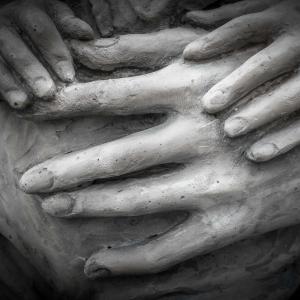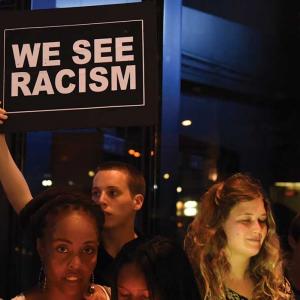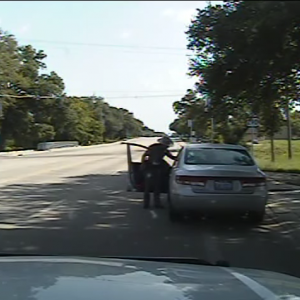
Adam Ericksen is the Education Director for the Raven Foundation, where he uses mimetic theory to provide social commentary on religion, politics, pop culture. He has a Masters in Theological Studies from Garrett Evangelical Theological Seminary where he wrote his thesis “Love and Nonviolence in Christianity and Islam.” Adam is a youth pastor and chaplain. He is also a frequent speaker at conferences. Keep up with Adam by liking the Raven Foundation Facebook page and by following him on Twitter.
Posts By This Author
God’s Authority: Same-Sex Marriage and a Kentucky County Clerk

Image via Andrey_Popov/Shutterstock
A Kentucky clerk claimed “God’s authority” this week when she refused to issue a marriage license to same-sex couples. As I read her story, I was reminded of Peter, one of Jesus’ closest disciples, who had a vision about God’s authority.
This story is told in the Acts of the Apostles, chapter 10. The story about God’s authority comes down to this verse:
"God has shown me that I should not call anyone profane or unclean."
This verse was an absolute game changer for Peter and the early church. And it should be a game changer for us today.
ISIS’s Anti-Islamic Theology of Rape

Image via thomas koch/Shutterstock
As much as I’d like to blow ISIS away, if we are to take seriously the fact that God’s "mercy encompasses all things," then God’s mercy might extend even to ISIS. Will bombing ISIS stop their violent quest? It may stop their violent quest — but as we’ve seen during the last 13 years in the "War on Terror," when we violently destroy one enemy, another more dangerous enemy emerges.
We don’t need more bombs. The "War on Terror" has taught us that attempting to solve our problems with violence only reinforces a worldwide culture of violence. It teaches us and our enemies that violence is the only real solution to our problems. It reveals that we don’t really believe in God or Jesus or Allah. We and our enemies believe in the same god. And that god’s name is Violence. Our faith in the demonic god of violence will only lead us to a future of mutually assured destruction.
How to Defeat Evil
Christians believe that Jesus definitively defeated the forces of evil. For Christians, faith is trusting that the way to defeat evil is the same way that Jesus defeated evil on the cross and in the resurrection. Jesus was no Jedi. He didn’t use “good violence” to protect himself or others from the evil forces that converged against him. Nor did he run from evil. Rather, he defeated evil by entering into it, forgiving it on the cross, and offering peace to it in the resurrection.
Of course, many – even those who profess to follow him – think Jesus is absolutely crazy. As the apostle Paul wrote, “We proclaim Christ crucified, a stumbling block to Jews and foolishness to Gentiles.” It’s true that following Jesus by responding to evil with nonviolent love is risky. After all, Christ was killed, as were his disciples. But fighting violence with violence is also risky and only perpetuates a mimetic cycle of violence.
My White Dad and Sandra Bland: On 'Assaulting' a Police Officer
Once again we find white people blaming a black victim of violence. She’s to blame because she was “irritated.” She’s to blame because she refused to put out her cigarette. She’s to blame because she’s black.
A white response that blames Sandra Bland is a racist response. White people can get away with being irritated at police. We don’t have to be kind to officers. We can express our anger and not fear arrest.
A black person though? If a black person shows any anger, they will likely be arrested or possibly killed. And it will be construed as their fault.
The Planned Parenthood Scandal: Beyond the Morality Police

Morality judgment illustration, VIGE.CO / Shutterstock.com
Our cultural pattern of becoming scandalized by the other side isn’t helping. Whichever side we are on, becoming the morality police is only making the scandal worse as we scapegoat and talk past each other. This pattern gets us stuck in a scandal of unhealthy righteous indignation over and against our opponents.
The alternative to getting stuck in a scandal isn’t to avoid scandals, but rather to go through them. As we go through them, we might just discover ourselves becoming un-scandalized as we see that the other is actually motivated by a good goal. In acknowledging the other’s good goal, we begin to see them as human and not the evil demons our minds have made them out to be.
Does White America Really Believe in Forgiveness?

Image via Pikul Noorod/Shutterstock
“I will never talk to her ever again. I will never be able to hold her again. ...You hurt me. You hurt a lot of people. But I forgive you.”
Those words of accountability and forgiveness were spoken to Dylann Roof at his bond hearing by the family of one of his victims.
How are we to understand such radical forgiveness?
Many white Americans interpret black forgiveness as absolution for the racist attitudes that led to the attack. We distort that forgiveness in a way that doesn’t hold us accountable for changing the racist political, economic, and educational structures that infect our country.
When we celebrate black forgiveness but refuse to be accountable to that very forgiveness then we are doing nothing more than creating an aura of deniability. By celebrating black forgiveness of those persecutors like Dylann Roof, we can safely deny that we participate in and benefit from racist structures that persecute black people. In other words, we can so twist the blessed act of forgiveness that we manipulate it to deny that we are persecutors, too.
Demons of War

Image via John Gomez/shutterstock.com
Soldiers know on a deep moral level that in committing great harm to others, they have committed great harm to themselves. They don’t need our society to project our demons of war — our own moral injury — upon them as we point the finger of accusation against them. Soldiers have suffered enough moral injury. We need to take responsibility for our own.
Why God Is Your Mother

Statue of mother and child hands. Photo by Germano Poli / Shutterstock.com
Here’s the thing. God is your father and your mother and God transcends those categories because God is neither literally male nor female. But Father Longnecker thinks calling God Father and Mother is just too confusing for people. Apparently, the fact that God is One, yet Three, but really One … that isn’t confusing at all. But to call God Father and Mother … we can’t wrap our minds around that.
Father Longnecker is right that when his disciples asked Jesus how they should pray, he responded that they should pray to the father. Father Longnecker claims this is his slam dunk against calling God Mother. Jesus didn’t teach us to pray to our mother, but to our father.
Dear White People: Why I Am Racist and So Are You

New York City candlelight vigil at the Barclay's Center on behalf of victims of the Emanuel A.M.E massacre, Photo by a katz / Shutterstock.com
White people can no longer afford to deny the violent racism that infects our lives. Rather, we must take responsibility for it. The first thing we need to do is to name it. Yes, name it in people like the terrorist who killed the nine people at Emmanuel last Wednesday. Name it in our political, economic, and entertainment systems that propagate and benefit from racist structures. For example, did you know that currently, “the U.S. has a greater wealth gap between whites and blacks than South Africa did during apartheid?” Name it for the sinful, demonic structure that it is.
But just as important, name the racism that infects you. It’s not helpful to just name racism in others if we don’t also take responsibility for the racism within each of us. Name it in yourself so that you can repent from it. And once you repent from it, name it again and again. Racism is so embedded in our culture that its evil will surely return to our lives.
Rachel Dolezal, Matt Lauer, and the African-American Experience
I don’t know what Rachel has been through in her life, but Jamelle Bouie makes an important distinction in understanding Rachel’s situation over at Slate. He writes that, “To belong to the black community is to inherit a rich culture; to be racially black is to face discrimination and violence.” Here’s a bit of information about the modern black experience of racism, discrimination, and violence in the U.S. FYI – being black in America is more dangerous than gaining custody of an adopted brother and drawing with crayons.
A Tale of Two Pharaohs: On Horse Racing and Transformed Hearts
After winning the Triple Crown, American Pharoah’s jockey, Victor Espinoza, showed that he doesn’t live in fear of losing his power. And, as opposed to the Egyptian Pharaoh, he showed he has a soft heart for those who are suffering.
Espinoza reportedly earned $80,000 for his victory at the Belmont Stakes and he’s giving it all away. “I won the Triple Crown right now,” he stated, “but I don’t make any money because I’m donating all the money to the City of Hope.” The City of Hope is a cancer research and treatment center. Espinoza also donates his time at the City of Hope, visiting with children struck by cancer. He says, “The kids [are] 6 years old, 10 years old, it’s just heartbreaking.” Why does he do it? “I just saw one kid with the disease and that’s how I changed my life. I changed the way I think. Pretty much I changed everything … the first change I made was in my heart.”
Buddhism and Christianity: On Grief, Mandalas, and Resurrection
The early Christians had to deal with the loss of their most important mandala — the one they called their Lord and Savior, Jesus Christ. Isn’t Christianity weird? I mean, Christians revere Jesus the Messiah, the King. That’s weird because the one Christians revere as the incarnate word of God was killed. He became a victim of human violence.
How do you atone for that? How do you reconcile with the fact that the one whom Christians worship became a victim of human violence?
The Theology of a Biker Gang
One of the biker gangs is called the “Bandidos.” They originated in Texas during the 1960s. In 2013, federal law enforcement produced a national gang report that identified the Bandidos as one of the five most dangerous biker gang threats in the U.S.
And they have a theology and an anthropology that you should know about. They’re summed up in one of their slogans:
God forgives. Bandidos don’t.
Jesus, Drawing Muhammad, and the Idolatry of Free Speech
If Christians are going to take seriously Jesus’ command to follow him, then we need to stop this absurd defense of drawing pictures of Muhammad. And if we defend the practice of ridiculing our fellow human beings by hiding behind the freedom of speech, then we have made freedom of speech into an idol.
Pamela Geller, as a non-Christian, has the right to host the conference. But Christians do not have the right, or the freedom, to support the conference. For Christians, freedom comes from following Christ in loving God and our neighbors as we love ourselves. The obvious implications of Jesus’ command to love our neighbors means that we should not mock them.
'Deflategate' and How Not to Scapegoat Tom Brady
This isn’t just about Tom Brady. As much as I may hate the guy, he and I have some things in common. Rhoden is pointing to a crisis that all humans face. No matter how successful we appear, we all face the same existential lack of being. I can have all the success and money in the world, but I will still feel an emptiness in my soul.
Why do we experience this lack of being? Because we are constantly comparing ourselves with others. This comparison leads us to believe that we aren’t enough, that we lack something within ourselves, and so we try to obtain something that will fill the void within our soul.
Tell Me About Eternity: A Reflection on Mothers, Death, and God’s Love
“So, tell me about eternity …”
“Eternity?!?” I thought to myself. “I’m just beginning to learn about the present! Eternity is mystery.”
As a pastor, I’ve been trained to not answer those kinds of questions. It’s best to invite others to explore and answer their own questions, as opposed to giving our answers. But for some reason that felt inauthentic in the moment. Sometimes providing answers is the most compassionate thing we can do. But, in the face of eternity, who has answers?
How White People Corrupt Martin Luther King’s Message
I love Martin Luther King. I wrote my master’s thesis on his approach to nonviolence. King is the greatest prophet in the history of the United States. And white people should know him better.
Blitzer, like so many white people, doesn’t know Martin Luther King. He misses King’s point. If white people want to reference King, we need to stop using him to condemn black violence. We need to stop pitting a black man against black people. It’s patronizing. It’s demeaning. And it misses the point.
Bruce Jenner and God’s Response to Transgender People
Caryn Riswold wrote a moving article about Bruce Jenner’s interview on Friday with Dianne Sawyer. In the interview, Bruce states, “For all intents and purposes, I’m a woman. People look at me differently. They see you as this macho male, but my heart and my soul and everything I do in life – it is part of me. That female side of me. That’s who I am.”
Caryn’s article is titled “How Should People of Faith Respond to Bruce Jenner?” It is a compassionate response to Jenner and all people who identify as transgender. She states that all people are created in the image of God and so deserve our love and compassion. Sadly, many religious people disagree with Caryn, insisting that Jenner is confused, crazy, or just out for attention.
Caryn worries that Jenner will be mocked and ridiculed. She states that people of faith should not respond with ridicule, but rather with acceptance and compassion.
Pay attention to the one who isn’t laughing. The one who looks upset. The one who is desperately trying to escape the gaze and the mockery.
Pay attention to the ones on the margins. Whose image are they created in?
Monica Lewinsky and Jesus Christ: Overcoming the Place of Shame
Monica Lewinsky and Jesus Christ had a similar experience — they both occupied the place of shame.
In 1998, Monica became a lightning rod for shame in American culture. In her recent TED talk, The Price of Shame, she talks about her experience of public shame. With refreshing humor, she takes responsibility for the “wrong turns” she has taken.
The Lewinsky scandal happened on the cusp of the Internet boom. It was one of the first Internet scandals to go viral. Monica reflects that, “What that meant for me personally, was that overnight I went from being a completely private figure, to a publicly humiliated one worldwide.”
But Monica’s point is not that she’s a victim of shame. Rather, she is using her experience to warn us about our cultural inclination to put others in the place of shame. She hopes that sharing her experience “can lead to a cultural change that results in less suffering for others.”
And there has been a lot of suffering. The Internet has become a public hub of shaming. Monica states that, “A market place has emerged where public humiliation is a commodity and shame is an industry.”
Shame is big business on the Internet. Promoting scandals is the easiest method to get clicks. Monica explains the dangers of this economic system in a radically prophetic way:
"The more shame, the more clicks, the more clicks, the more advertising dollars. We are in a dangerous cycle. The more we click on this kind of gossip, the more numb we get to the human lives behind it. And the more numb we get, the more we click. All the while, someone is making money off of the back of someone else’s suffering. With every click we make a choice. The more we saturate our culture with public shaming, the more accepted it is, the more we will see behaviors…that have humiliation at their core. This behavior is a symptom of the culture we have created."
A culture of shame is more than making money on the Internet. It’s also about developing a sense of moral superiority over and against another person. Gossip sites are addictive because they allow us to feel good about ourselves at the expense of another. Notice that we feel the need to gossip and scapegoat others because we don’t feel good about ourselves. And so we unite with others against another person. Gossip boils down to this thought that runs through our heads: How could they do such a stupid thing! At least I’m not as bad as them!
Ishtar vs. Easter: Pick Your Story
 In the midst of my family’s Easter celebration yesterday, I decided to check Facebook. Most of my friends posted comments like “Happy Easter!” and shared pictures of their celebrations.
In the midst of my family’s Easter celebration yesterday, I decided to check Facebook. Most of my friends posted comments like “Happy Easter!” and shared pictures of their celebrations.
But this meme also appeared on my feed:
The meme is attributed to Richard Dawkins’ Foundation for Reason and Science and is meant to debunk Christianity and Easter as just another example of an ancient myth. The reasoning goes like this – Christianity has so much in common with other ancient myths, so how can we take Christianity seriously?
The meme shows the ancient Assyrian and Babylonian goddess Ishtar and makes a few claims against Christianity. The first is that “Ishtar” was pronounced “Easter.” The second is that Ishtar was the goddess of fertility and sex and so her symbols were an egg and bunny. The meme concludes that Easter is merely a copy of the Ishtar myth and its roots are “all about celebrating fertility and sex.”
Megan McArdle of the Daily Beast did an excellent job debunking the meme.











